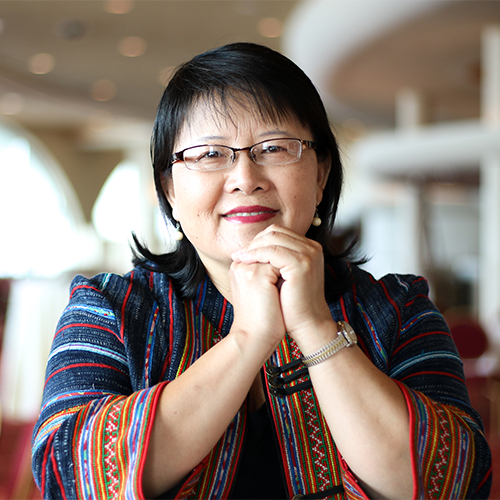Mai Zong Vue was born on February 2, 1965, in Laos, a country in Southeast Asia. In 1975, Vue’s family left the country for Thailand because of the persecution of Hmong families like hers after the Vietnam War. For the next five years, they lived in refugee camps, which were often violent.
In 1980, Vue’s family immigrated to the United States through a church sponsorship and settled in Kimberly, Wisconsin. Her family became permanent residents after two years. After five years, they became citizens. Vue didn’t speak English when she started school in the US and experienced racism from her classmates. Her parents were seasonal farm workers, and on the weekends, she joined them. Vue was the first in her family to attend college, despite pressure from family members to get married.
Vue graduated from Lakeland College (now Lakeland University) in 1990 with a bachelor’s degree in business administration and received a master’s in social work from University of Wisconsin–Madison in 1997. During college, she connected with her Hmong identity by practicing classic Hmong folk songs. For 20 years, Vue worked for the Wisconsin State Refugee Office as a program specialist, helping create non-profit organizations for women, including the Refugee Family Strengthening Program, which helps domestic abuse victims. In 1995, she was a delegate for the United Nations’ Fourth Conference on Women in Beijing and, in 1996, was a member of the Hmong American Delegation to the Napho Refugee Camp in Thailand. Vue is the chief operating officer of the Hmong Institute, a nonprofit focusing on the betterment of Hmong people in America, and was formerly the board president of Hmong National Development Inc. She has worked to support refugees, especially women, through national and international efforts, including co-founding the Refugee Women’s Network.
After a 2012 report showed Hmong students in Madison were struggling with math and reading, Vue and her husband co-founded the Hmong Language and Cultural Enrichment Program, a summer camp that immerses children in Hmong language and culture. The program has been so successful that it inspired the creation of a dual bilingual education program in the Madison School District.
For her advocacy, Vue has been recognized by the Dane County YMCA, the Wisconsin Coalition Against Domestic Abuse, and the Department of Workforce Management. In 2020, the Wisconsin Historical Society Press published her book, Hmong in Wisconsin, a collection of personal stories from Hmong people across the state. She retired from her position at the state Department of Health Services in 2023, and she continues her commitment to her culture with frequent performances of traditional Hmong folk music.
LEARN MORE
“About Us.” The Hmong Institute. https://thehmonginstitute.org/about-us/
Bull, Brian. “Hmong Folk Music Lives On In Wisconsin,” Wisconsin Public Radio, 6 March 2006, https://www.wpr.org/news/hmong-folk-music-lives-wisconsin
“Hmong Culture as a Prelude to Academic Success,” Community Shares of Wisconsin, 11 Jul 2016, https://www.communityshares.com/voices/hmong-culture-as-a-prelude-to-academic-success/
Hornbacher, Jon. “Hmong Parents Help Bridge The Culture Gap for Hmong Kids,” 12 November 2018, https://www.wisconsinlife.org/story/hmong-parents-help-bridge-the-culture-gap-for-hmong-kids/
Vue, M. Z. (2020). Hmong in Wisconsin. Madison, WI: Wisconsin Historical Society Press.
Photo from The Hmong Institute’s website.
Profile written by Emma McClure, student coordinator of the Wisconsin Women Making History project.
